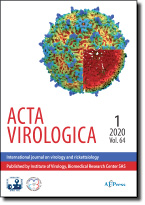Acta Virologica Vol.66, No.2, p. 192 – 194, 2022
|
| Title: Common weeds as alternate hosts of Mexican variant of Papaya meleira virus in papaya orchards in México |
| Author: Isabel García-Cámara, Daisy Pérez-Brito, Raúl Tapia-Tussell, Anuar Magaña-Álvarez, Alberto Cortés-Velázquez, Rodolfo Martín-Mex, Oscar Alberto Moreno-Valenzuela |
|
Abstract: Presence of alternate hosts of plants is a great threat to the agriculture industry. Plants from several species growing in the papaya orchards affected by papaya sticky disease were examined for Papaya meleira virus (PMeV) infection causing this disease. The viral dsRNA was already detected in some plants from the family Poaceae or in watermelon. To identify new hosts of PMeV, we have collected 38 plant species belonging to 15 families of common weed species found in papaya-growing areas in México and used reverse-transcription PCR (RT-PCR) or quantitative real-time RT-PCR (RT-qPCR) for virus detection. We have detected the viral RNA in 11 species belonging to the families Acanthaceae, Fabaceae and Poaceae. Under experimental conditions, PMeV-Mx in Panicum hirsutum and Ruellia nudiflora inoculated weed species, showed that PMeV-Mx is able to replicate in plant cells of these species and spread in a systemic way. These results highlight the importance of weed species as potential virus reservoirs for PMeV-Mx
|
|
| Keywords: Papaya meleira virus; papaya sticky disease; Carica papaya; RT-PCR; TaqMan |
|
|
Published online: 29-Jun-2022
|
| Year: 2022, Volume: 66, Issue: 2 |
Page From: 192, Page To: 194 |
doi:10.4149/av_2022_209
|
|
 download file download file |
|
|
|
|
 download file
download file
